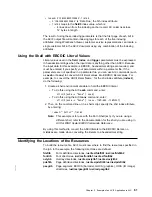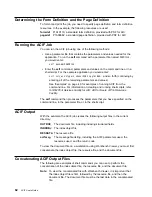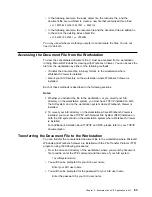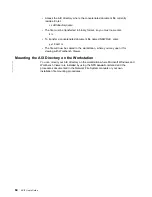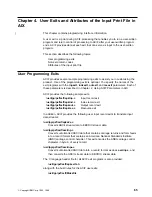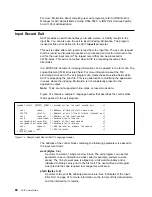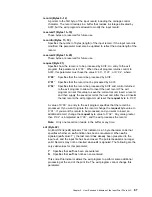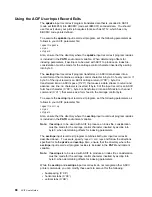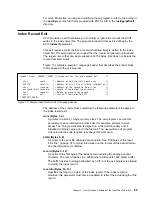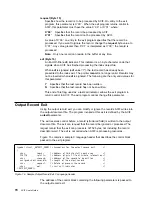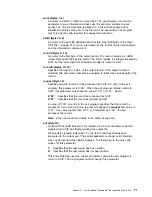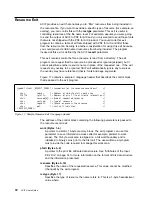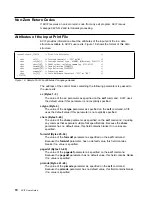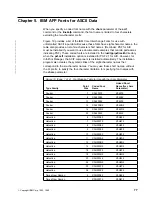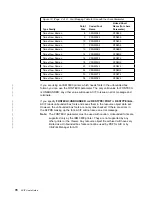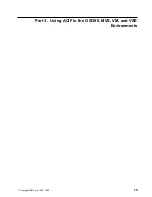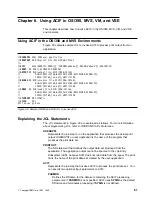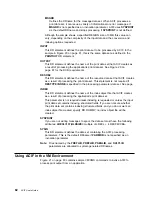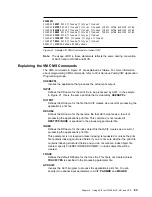
Using the ACIF User Input Record Exits
The apka2e input record exit program translates data that is encoded in ASCII
(code set IBM-850) into EBCDIC (code set IBM-037) encoded data. You should
use this exit when your print job requires fonts such as GT12, which has only
EBCDIC code points defined.
To execute the apka2e input record exit program, set the following parameters as
follows in your ACIF parameter file:
inpexit=apka2e
cc=yes
cctype=z
Also, ensure that the directory where the apka2e input record exit program resides
is included in the PATH environment variable. When determining offsets for
indexing parameters, if asciinp is to be used with ACIF to produce an index file,
consideration must be made for the carriage control character inserted by asciinp
into byte 0.
The asciinp input record exit program transforms an ASCII data stream into a
record format that contains a carriage control character in byte 0 of every record. If
byte 0 of the input record is an ASCII carriage return (X
'
0D
'
), byte 0 is
transformed into an ASCII space (X
'
20
'
) that causes a data stream to return and
advance one line; no character is inserted. If byte 0 of the input record is an ASCII
form feed character (X
'
0C
'
), byte 0 is transformed into an ANSI skip to channel 1
command (X
'
31
'
) that serves as a form feed in the carriage control byte.
To execute the asciinp input record exit program, set the following parameters as
follows in your ACIF parameter file:
inpexit=asciinp
cc=yes
cctype=z
Also, ensure that the directory where the asciinp input record exit program resides
is included in the PATH environment variable.
Note: If asciinp is to be used with ACIF to produce an index file, consideration
must be made for the carriage control character inserted by asciinp into
byte 0, when determining offsets for indexing parameters.
The asciinpe input record exit program combines both user input record exits
described above. To execute, specify
inpexit=asciinpe
and follow the directions
specified for both apka2e and asciinp. Also, ensure that the directory where the
asciinpe input record exit program resides is included in the PATH environment
variable.
Note: If asciinpe is to be use d with ACIF to produce an index file, consideration
must be made for the carriage control character inserted by asciinp into
byte 0, when determining offsets for indexing parameters.
While the asciinp and asciinpe input record exits do not recognize other ASCII
printer commands, you can modify these exits to account for the following:
backspacing (X
'
08
'
)
horizontal tabs (X
'
09
'
)
vertical tabs (X
'
0B
'
)
68
ACIF User’s Guide
Summary of Contents for S544-5285-01
Page 1: ...IBM Print Services Facility IBM AFP Conversion and Indexing Facility User s Guide S544 5285 01...
Page 2: ......
Page 3: ...IBM Print Services Facility IBM AFP Conversion and Indexing Facility User s Guide S544 5285 01...
Page 10: ...viii ACIF User s Guide...
Page 22: ...2 ACIF User s Guide...
Page 40: ...20 ACIF User s Guide...
Page 41: ...Part 2 Using ACIF in the AIX Environment Copyright IBM Corp 1993 1999 21...
Page 42: ...22 ACIF User s Guide...
Page 72: ...52 ACIF User s Guide...
Page 96: ...76 ACIF User s Guide...
Page 99: ...Part 3 Using ACIF in the OS 390 MVS VM and VSE Environments Copyright IBM Corp 1993 1999 79...
Page 100: ...80 ACIF User s Guide...
Page 106: ...86 ACIF User s Guide...
Page 134: ...Figure 24 Example of a Customer s Phone Bill 114 ACIF User s Guide...
Page 142: ...122 ACIF User s Guide...
Page 196: ...176 ACIF User s Guide...
Page 197: ...Part 4 Appendixes Copyright IBM Corp 1993 1999 177...
Page 198: ...178 ACIF User s Guide...
Page 206: ...186 ACIF User s Guide...
Page 210: ...190 ACIF User s Guide...
Page 226: ...206 ACIF User s Guide...
Page 253: ......








